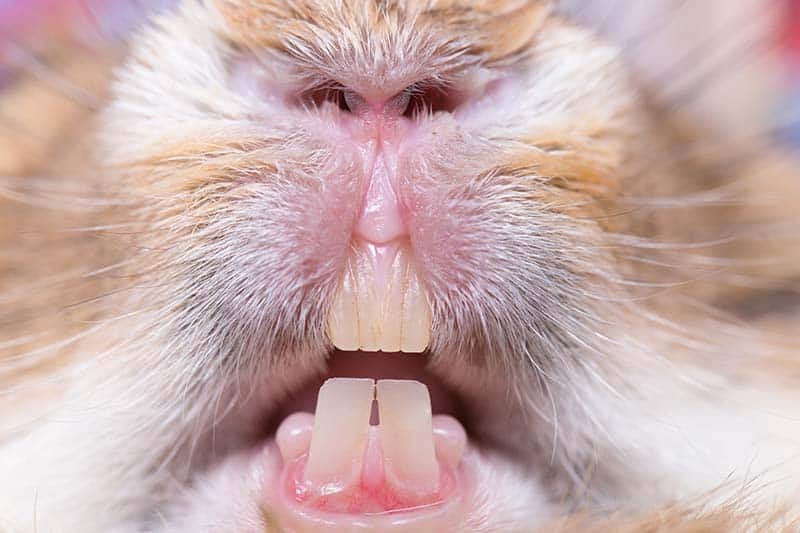Rabbits can be hard to read, but paying close attention can reveal some unique behaviors. One such behavior is teeth grinding, which can indicate various emotions. Understanding this behavior is crucial in determining how your rabbit is feeling. Like purring for cats and barking for dogs, teeth grinding is a form of communication for rabbits. It is their way of expressing their emotions, which can range from no cause for concern to a sign of discomfort.
This article delves into rabbit teeth grinding, the different types, and the reasons behind this behavior to help you better understand your rabbit.
Rabbit Teeth Grinding – What Is It?
Rabbit teeth grinding is a behavior that rabbits exhibit involuntarily, whether they are happy or in pain. You may notice your rabbit grinding their teeth when you pet them or when they are sleeping. If the grinding is subtle and not loud, there is usually no need to worry, as it can indicate contentment. However, if the grinding is loud and persistent, it may suggest that your rabbit is in pain or discomfort.
Rabbit teeth grinding is a normal behavior, but understanding the two types of grinding can help you determine your rabbit’s emotional state.
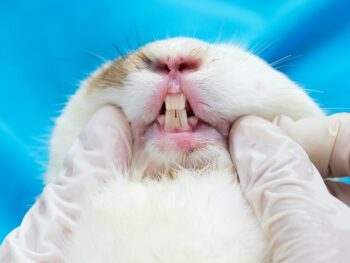
What Are the Different Types of Teeth Grinding?
There are two types of rabbit teeth grinding: soft grinding or purring and aggressive grinding. Soft grinding, resembling purring or teeth clicking, is a sign of a relaxed and happy rabbit. It is usually quiet and rhythmic. On the other hand, aggressive grinding is loud and irregular, indicating potential pain or discomfort. If you hear aggressive grinding, it is essential to consult a vet to address the underlying issue.
Why Do They Do It?
Subtle teeth grinding during petting signifies a happy and comfortable rabbit. However, aggressive grinding can indicate stress, anxiety, or illness. Common stress triggers for rabbits include changes in routine, loud noises, vet visits, and unsanitary living conditions. If your rabbit is grinding their teeth excessively and drooling, it could be a sign of dental issues like ptyalism, necessitating prompt veterinary care.
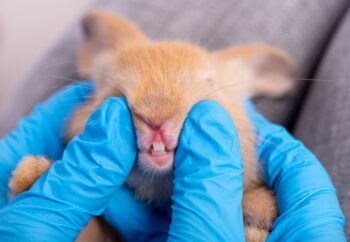
Ptyalism can cause pain, leading to teeth grinding. Other signs of ptyalism include wet fur around the mouth, weight loss, loss of appetite, and facial asymmetry. Managing your rabbit’s oral health with a proper diet, including hay, is crucial in preventing dental issues.
How To Know If Your Rabbit is in Pain
Aside from teeth grinding, signs that your rabbit is in pain include retreating behavior, lack of grooming, loss of appetite, and unusual posture. Promptly addressing your rabbit’s pain is vital to prevent further health complications.
Importance of Pain Management for Your Rabbit
Unmanaged pain in rabbits can lead to severe health issues, including shock. It is crucial to manage your rabbit’s pain effectively by identifying and treating the underlying cause. Seeking veterinary care for a rabbit showing signs of pain is essential for their well-being.
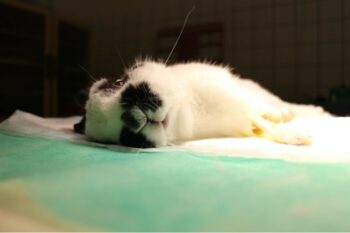
Frequently Asked Questions (FAQs)
How Do I Prevent Tooth Grinding?
While teeth grinding cannot always be prevented, ensuring your rabbit’s overall well-being, including a balanced diet, regular exercise, and a stress-free environment, can help minimize stress and discomfort.
Is My Rabbit Purring or Grinding Its Teeth?
If your rabbit’s teeth grinding is quiet and occurs during positive interactions, such as petting, it is likely purring. However, loud grinding accompanied by other signs of distress may indicate a more serious issue.
What Does It Mean if My Rabbit Stops Purring?
If your rabbit stops purring and displays agitated behavior, it could indicate discomfort or restlessness. Observing your rabbit’s body language and behavior can help you understand their needs better.
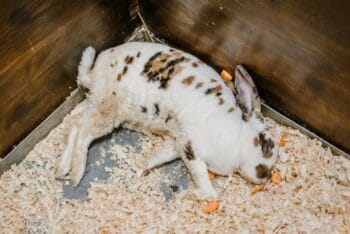
A Quick Reference Guide- The Difference Between Tooth Grinding & Purring
| Tooth Grinding | Tooth Purring |
| Infrequent | Hard to hear |
| Sounds aggressive | Relaxed |
| Agitated | Rhythmic |
| Alert and fearful | Eyes are relaxed |
Final Thoughts
Understanding your rabbit’s behavior is key to identifying any potential issues. Aggressive teeth grinding should be investigated further, as it may indicate stress or pain. Prompt veterinary care is essential if your rabbit shows signs of discomfort. On the other hand, quiet teeth grinding during positive interactions is a sign of contentment. Paying attention to your rabbit’s behavior and seeking professional help when needed ensures their well-being.
Featured Image Credit: Roselynne, Shutterstock

